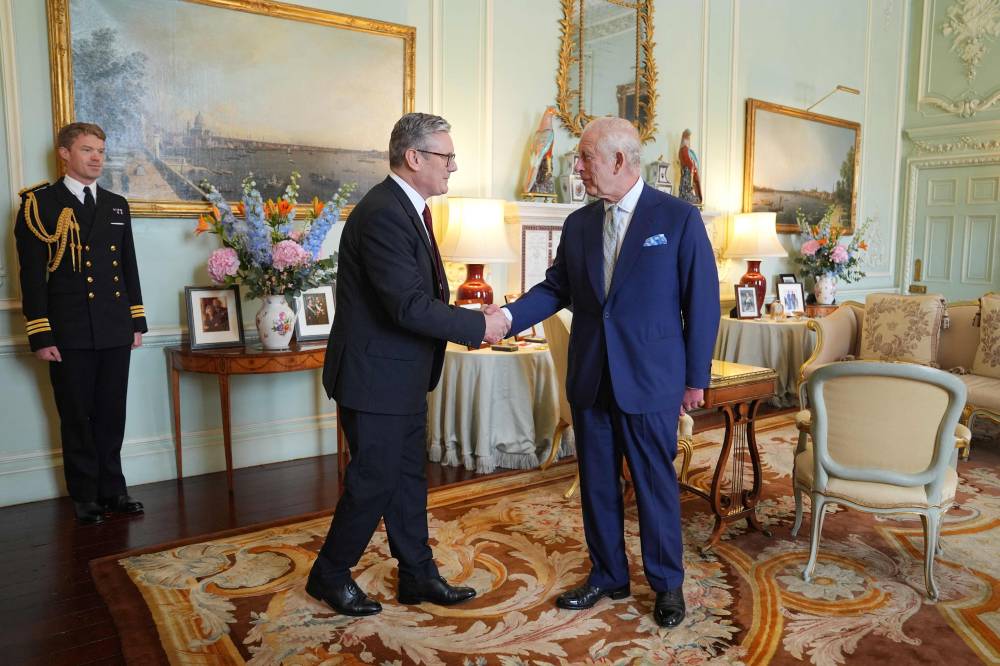UK Labour win promises 'greater synergy' between govt and king
As a constitutional monarch, Charles is not supposed express any political opinion in public and does not vote.

LONDON - King Charles III showed little sympathy to Conservative Prime Minister Liz Truss when they met during her ill-fated premiership in October 2022, saying to her: "Back again? Dear oh dear. Anyway."
Truss resigned eight days later, just seven weeks into Charles's reign, after her radical tax-cutting proposals spooked the financial markets.
She was followed into office by Rishi Sunak, who resigned on Friday after the Conservative Party's crushing defeat in the general election.
Keir Starmer, the 61-year-old leader of the Labour Party, will now become the third prime minister in two years after Charles tasked him with forming a new government during a meeting at Buckingham Palace.
As a constitutional monarch, Charles is not supposed express any political opinion in public and does not vote.
When Truss objected to his plans to attend the 2022 COP 27 climate summit in Egypt, Charles -- a long-time defender of the environment -- did not go.
Experts have suggested Charles has some ideological affinity with Starmer -- a one-time anti-monarchist -- and will likely greet his arrival with some relief, hoping he can restore political stability.
"We know a lot about King Charles III because he expressed so many opinions when he was Prince of Wales before he became king," professor Ed Owens, a specialist in the monarchy, told AFP.
"I think we can therefore anticipate a greater synergy between the king and his new prime minister," he added.
Owens said the king had "long expressed concern around key social issues, including poverty, issues around the food crisis in the UK, homelessness and concerns around young people's education and opportunities."
Starmer, with whom the monarch will have a private weekly meeting, "has demonstrated a key interest in these areas, so you could say that there's a closer crossover," he added.
While Labour has scaled back its green investment plans -- a subject dear to the king's heart -- it is aiming to decarbonise the electric grid by 2030.
Johnson spat
Boris Johnson also put the monarchy into an uncomfortable position in August 2019, by getting the late Queen Elizabeth II to prorogue or suspend parliament, as he tried to get the green light for his Brexit divorce deal.
The Supreme Court ruled the move illegal, causing embarrassment for the monarch.
Before his mother's death, Charles said privately in June 2022 that he found Johnson's plan to send failed asylum seekers to Rwanda "appalling", according to a newspaper report that was not denied.
An angry Johnson "went in quite hard" on Charles over criticisms of "the democratically elected government" when they attended a joint summit, according to Gutto Harri, who was the Downing Street director of communications at the time.
The relationship "never fully recovered", he added.
Starmer has already made it known that he will abandon the Rwanda policy.
The monarchy is also hoping Starmer will bring about a period of more stable governance, after five Conservative prime ministers in 14 years.
The Labour Party "is going to be more respectful of political process and the constitution," said Owen, who pointed out that Starmer was knighted by Charles in 2014 for his service as the country's top prosecutor, making him "Sir Keir".
The monarchy "has always been driven by the self-interest of self-preservation," Owens added.
"It tends to prefer governments that don't want to create lots of turbulence, that emphasise stability and national unity," he explained.
According to Owens, Queen Elizabeth was not a big fan of Margaret Thatcher because she thought her agenda was too radical and that too many people would lose out, which could create instability.
"When the country is stable, when the country is unified... the monarchy is in a more secure position," he added. - AFP









